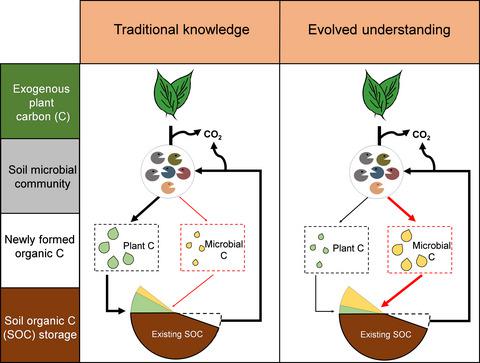当前位置:
X-MOL 学术
›
Glob. Change Biol.
›
论文详情
Our official English website, www.x-mol.net, welcomes your feedback! (Note: you will need to create a separate account there.)
The soil microbial carbon pump: From conceptual insights to empirical assessments.
Global Change Biology ( IF 11.6 ) Pub Date : 2020-08-25 , DOI: 10.1111/gcb.15319 Xuefeng Zhu 1, 2 , Randall D Jackson 3 , Evan H DeLucia 4, 5 , James M Tiedje 6 , Chao Liang 1
Global Change Biology ( IF 11.6 ) Pub Date : 2020-08-25 , DOI: 10.1111/gcb.15319 Xuefeng Zhu 1, 2 , Randall D Jackson 3 , Evan H DeLucia 4, 5 , James M Tiedje 6 , Chao Liang 1
Affiliation

|
The global soil carbon (C) pool is massive, so relatively small changes in soil organic carbon (SOC) stocks can significantly alter atmospheric C and global climate. The recently proposed concept of the soil microbial carbon pump (MCP) emphasizes the active role of soil microbes in SOC storage by integrating the continual microbial transformation of organic C from labile to persistent anabolic forms. However, the concept has not been evaluated with data. Here, we combine datasets, including microbial necromass biomarker amino sugars and SOC, from two long‐term agricultural field studies conducted by large United States bioenergy research programs. We interrogate the soil MCP concept by investigating the asynchronous responses of microbial necromass and SOC to land‐use change. Microbial necromass appeared to preferentially accumulate in soil and be the dominant contributor to SOC accrual in diversified perennial bioenergy crops. Specifically, ~92% of the additional SOC enhanced by plant diversity was estimated to be microbial necromass C, and >76% of the additional SOC enhanced by land‐use transition from annual to perennial crops was estimated to be microbial necromass. This suggests that the soil MCP was stimulated in diversified perennial agroecosystems. We further delineate and suggest two parameters—soil MCP capacity and efficacy—reflecting the conversion of plant C into microbial necromass and the contribution of microbial necromass to SOC, respectively, that should serve as valuable metrics for future studies evaluating SOC storage under alternative management in changing climates.
中文翻译:

土壤微生物碳泵:从概念洞察到经验评估。
全球土壤碳(C)池很大,因此土壤有机碳(SOC)存量的相对较小的变化会显着改变大气碳和全球气候。最近提出的土壤微生物碳泵(MCP)概念强调了土壤微生物在有机碳存储中的积极作用,其方法是将有机碳从不稳定性形态转化为持久性合成代谢形式进行持续的微生物转化。但是,尚未对该概念进行数据评估。在这里,我们结合了由美国大型生物能源研究计划进行的两次长期农业田间研究得出的数据集,包括微生物坏死生物标志物氨基糖和SOC。我们通过研究微生物坏死和SOC对土地利用变化的异步响应,来询问土壤MCP概念。微生物坏死似乎优先在土壤中积累,并且是多年生生物能源多样化作物中SOC累积的主要贡献者。具体而言,估计约有92%的因植物多样性而增加的SOC是微生物坏死微生物,而超过76%的因土地利用从一年生作物向多年生作物过渡而增加的SOC估计是微生物坏死微生物。这表明在多种多年生农业生态系统中都刺激了土壤MCP。我们进一步划定并提出两个参数-土壤MCP 土地利用从一年生作物向多年生作物过渡所增加的额外SOC中,有76%是微生物坏死。这表明在多种多年生农业生态系统中都刺激了土壤MCP。我们进一步划定并提出两个参数-土壤MCP 土地利用从一年生作物向多年生作物过渡所增加的额外SOC中,有76%是微生物坏死。这表明在多种多年生农业生态系统中都刺激了土壤MCP。我们进一步划定并提出两个参数-土壤MCP能力和功效-分别反映出植物C向微生物坏死的转化以及微生物坏死对SOC的贡献,这应作为未来研究评估气候变化替代管理下SOC储存的有价值的指标。
更新日期:2020-10-19
中文翻译:

土壤微生物碳泵:从概念洞察到经验评估。
全球土壤碳(C)池很大,因此土壤有机碳(SOC)存量的相对较小的变化会显着改变大气碳和全球气候。最近提出的土壤微生物碳泵(MCP)概念强调了土壤微生物在有机碳存储中的积极作用,其方法是将有机碳从不稳定性形态转化为持久性合成代谢形式进行持续的微生物转化。但是,尚未对该概念进行数据评估。在这里,我们结合了由美国大型生物能源研究计划进行的两次长期农业田间研究得出的数据集,包括微生物坏死生物标志物氨基糖和SOC。我们通过研究微生物坏死和SOC对土地利用变化的异步响应,来询问土壤MCP概念。微生物坏死似乎优先在土壤中积累,并且是多年生生物能源多样化作物中SOC累积的主要贡献者。具体而言,估计约有92%的因植物多样性而增加的SOC是微生物坏死微生物,而超过76%的因土地利用从一年生作物向多年生作物过渡而增加的SOC估计是微生物坏死微生物。这表明在多种多年生农业生态系统中都刺激了土壤MCP。我们进一步划定并提出两个参数-土壤MCP 土地利用从一年生作物向多年生作物过渡所增加的额外SOC中,有76%是微生物坏死。这表明在多种多年生农业生态系统中都刺激了土壤MCP。我们进一步划定并提出两个参数-土壤MCP 土地利用从一年生作物向多年生作物过渡所增加的额外SOC中,有76%是微生物坏死。这表明在多种多年生农业生态系统中都刺激了土壤MCP。我们进一步划定并提出两个参数-土壤MCP能力和功效-分别反映出植物C向微生物坏死的转化以及微生物坏死对SOC的贡献,这应作为未来研究评估气候变化替代管理下SOC储存的有价值的指标。



























 京公网安备 11010802027423号
京公网安备 11010802027423号